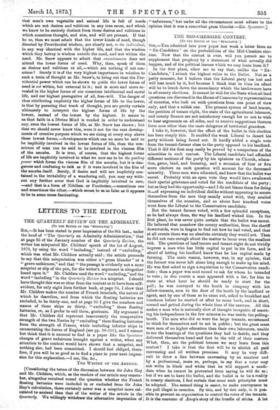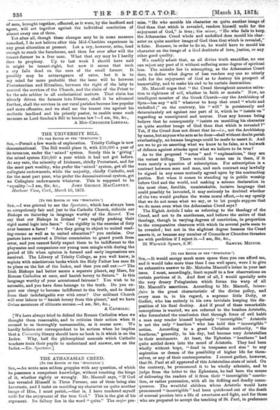THE MID-CHESHIRE CONTEST.
[TO THE EDITOR OF THE 1314101.1.201%.1 SIR,—Yon admitted into your paper last week a letter from an " Ex-Candidate" on the probabilities of the Mid-Cheshire elec- tion. Now that the contest is over, will you permit me to supplement that prophecy by a statement of what actually did happen, and of the political lessons which we may learn from it ?
In the first place, allow me to say that, unlike the " Ex- Candidate," I attach the highest value to the Ballot. Not as a party measure, for I believe that the Liberal party has lost and will lose much by it, but because I think that in time its effect will be to break down the ascendancy which the landowners have in all county elections. It cannot be well for the State when all land questions are discussed in the House of Commons by representatives of counties, who look on such questions from one point of view only, and that a selfish one. The present system of land tenure, the position of tenant-right, the state of the agricultural labourer, and county finance are not satisfactory enough for us not to wish to hear arguments on all sides, and to receive suggestions thereon from men other than the mere delegates of territorial grandees.
I take it, however, that the effect of the ballot in this election has been simply this. It enabled the weak Liberal to desert his party without being found out. It hardly added a single vote from the tenant-farmer class to the party opposed to his landlord. That it did the first may easily be proved by a comparison of the minorities in each contest. The Liberal candidate had offended different sections of the party by his opinions on Church, educa- tion, game, land, and licensing, and a secession of four or five score electors on each question will account for the decreased minority. These men were educated, and knew that the ballot was secret. Probably with an open vote they would have swallowed their special grievance and voted for the candidate of the party ; but as they had the opportunity—and I do not blame them for doing it—of expressing an individual dislike without appearing to secure themselves from the men they usually acted with, they availed themselves of the occasion, and so about four hundred votes went from the Liberal to the Conservative candidate.
But the tenant farmer voted, with a few splendid exceptions, as he had always done, the way his landlord wished him. In the first place, he was never quite certain that the ballot was secret. He believed that somehow the county authorities, from the sheriff downwards, were in league to find out how he had voted, and that at all events there was no absolute certainty they would not. Then he did not care enough about the matter to incur even the smallest risk. The questions of land tenure and tenant-right do not vividly impress a man who has little capital to put in his farm, and is afraid of letting his landlord know that he has capital made by farming. The main reason, however, was, in my opinion, that the farmer was never left alone long enough to make up his mind. He was first asked to sign a requisition to the Conservative candi- date ; then a paper was sent round to ask for whom he intended to vote ; in due course a man appeared with a list, for him to state at what hour he should be ready to start for the poll ; he was conveyed to the booth in company with his fellow-tenants, seen to the door of the booth by the landlord or agent, met by one of them as he came out, asked to breakfast and luncheon before he started or after he came back, and in short, nursed and petted during the whole time of the canvass. All this makes a man who is naturally slow of thought incapable of assert- ing his independence in the few minutes he was inside the polling- booth. The men who did so were the large tenants, accustomed to think for themselves and to act in public ; but the great mass were men of no higher education than their own labourers, unable to see the bearings of the questions they had to decide, and they delivered themselves hand and foot to the will of their masters. What, then, are the political lessons we may learn from this contest? I take it that the first will be to abolish all paid canvassing and all written promises. It may be very diffi- cult to draw a line between canvassing by an amateur and by a professional, more so, perhaps, to say that a voter may
not write in black and white that he will support a candi- date when he cannot be prevented from saying he will do so ; but if we are to have the ballot, and the ballot is to be a reality, in county elections, I feel certain that some such principles must be adopted. The second thing is easier, to make conveyance to
the poll illegal in counties. By this, and by this only, is it pos- sible to prevent an organisation to control the votes of the tenants. It is the converse of £sop's story of the bundle of sticks. A lot
of men, brought together, officered, as it were, by the landlord and agent, will act together against the individual conviction of almost every one of them.
Yet after all, though these changes may be in some measure remedied, I do not believe after this Mid-Cheshire experience in any great alteration at present. Let a cry, however, arise, loud enough to reach the farmhouse, and then for ever after will the tenant-farmer be a free man. What that cry may be I hardly dare to prophesy. Up to last week I should have said it might be tenant-right, but now it seems that such a cry falls dead on the ears of the small farmer. It possibly may be extravagance of rates, but it is to my mind far more probable that the issue will be between Protestantism and Ritualism, between the right of the laity to control the services of the Church, and the claim of the Priest to be the sole arbiter iu all ecclesiastical matters. That claim has already driven the farmers into Dissent, shall it be advanced further, shall the services in our rural parishes become less popular and more offensive, and we shall see the tenant rise against his msthetic landlord and his priestly pastor, to enable some such measure as Lord Saudon's Bill to become law ?—I am, Sir, &c.,
A MID-CHESHIRE LIBERAL.







































 Previous page
Previous page